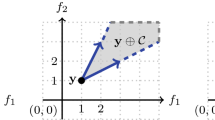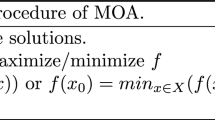Abstract
This article develops a new measure of freedom of choice based on the proposal that a set offers more freedom of choice than another if, and only if, the expected degree of dissimilarity between a random alternative from the set of possible alternatives and the most similar offered alternative in the set is smaller. Furthermore, a version of this measure is developed, which is able to take into account the values of the possible options.
Similar content being viewed by others
References
Arrow KJ (1995) A note on freedom and flexibility. In: Basu K, Pattanaik PK, Suzumura K (eds) Choice, welfare and development: a festschrift in honour of Amartya K. Sen. Oxford University Press, Oxford, pp 7–15
Bervoets S, Gravel N (2007) Appraising diversity with an ordinal notion of similarity: an axiomatic approach. Math Soc Sci 53(3): 259–273
Carter I (1999) A measure of freedom. Oxford University Press, Oxford
Jones P, Sugden R (1982) Evaluating choice. Int Rev Law Econ 2: 47–65
Koopmans TC (1964) On flexibility of future preference. In: Shelly MW, Bryan GL (eds) Human judgments & optimality. Wiley, New York, pp 243–254
Kreps DM (1979) A representation theorem for “preference for flexibility”. Econometrica 47(3): 565–577
Nehring K, Puppe C (2002) A theory of diversity. Econometrica 70(3): 1155–1198
Pattanaik PK, Xu Y (1990) On ranking opportunity sets in terms of freedom of choice. Rech Econ Louvain 56(3–4): 383–390
Pattanaik PK, Xu Y (1998) On preference and freedom. Theory Decis 44(2): 173–198
Pattanaik PK, Xu Y (2000) On diversity and freedom of choice. Math Soc Sci 40(2): 123–130
Puppe C (1996) An axiomatic approach to “preference for freedom of choice”. J Econ Theory 68(1): 174–199
Rosenbaum EF (2000) On measuring freedom. J Theor Polit 12(2): 205
Sen A (1990) Welfare, freedom and social choice: a reply. Rech Econ Louvain 56(3–4): 451–485
Sen A (1991) Welfare, preference and freedom. J Econom 50(1–2): 15–29
Sen A (1993) Markets and freedoms: achievements and limitations of the market mechanism in promoting individual freedoms. Oxford Econ Papers 45(4): 519–541
Sugden R (1998) The metric of opportunity. Econ Phil 14: 307–337
Sugden R (2003) Opportunity as a space for individuality: its value and the impossibility of measuring it. Ethics 113(4): 783–809
van Hees M (1998) On the analysis of negative freedom. Theory Decis 45(2): 175–197
van Hees M (2004) Freedom of choice and diversity of options: some difficulties. Soc Choice Welf 22(1): 253–266
Author information
Authors and Affiliations
Corresponding author
Rights and permissions
About this article
Cite this article
Gustafsson, J.E. Freedom of choice and expected compromise. Soc Choice Welf 35, 65–79 (2010). https://doi.org/10.1007/s00355-009-0430-4
Received:
Accepted:
Published:
Issue Date:
DOI: https://doi.org/10.1007/s00355-009-0430-4




